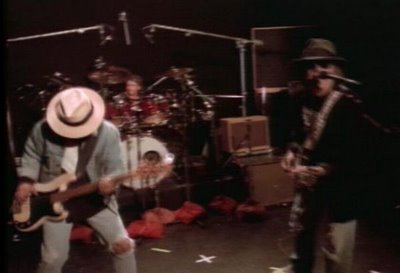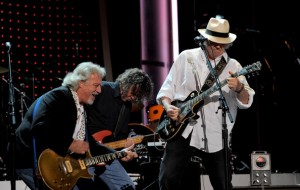Neil Young‘s “Cripple Creek Ferry” popped up on my iPod the other day. What a great, little snapshot of a song. What’s that film-making device called, when the camera pulls back and you just know the ending credits are about to roll? I love songs that serve that role, be it at the end of either side of an album (see The Undertones‘ “Casbah Rock” as another fine example of what might be a future Glossary entry).
Anyhow, as I listened to “Cripple Creek Ferry” for the first time in probably 6 months I was reminded of yet another unfulfilled rock ‘n roll dream: to record a song with what I’ll call a Ragged Canadian Chorus. Two of my main musical colleagues over the years, andyr and E. Pluribus Gergely, cringe at this approach to backing vocals. Beside the fact that they’ve shot me down whenever I’ve suggested this approach and that we don’t have the chops to pull off such deceptively casual backing vocals, we’re not Canadian.
In my mind I initially termed the loose, dragging, community-style chorus of “Cripple Creek Ferry” the Ragged Hippie Chorus, but then it occurred to me that the next two examples I had of this style were by Canadian artists: Joni Mitchell‘s “Circle Game” and almost any song on my second-favorite album of all time, The Band’s s/t sophomore triumph. It must be a Canadian thing, because when American bands try this it either sounds like shit (eg, The Jefferson Airplane and The Grateful Dead) or is a little too smooth (anything involving JD Souther with a hand cupped over his ear). When English bands try this they sound like a bunch of paunchy guys at their local pub’s Celtic night (eg, Fairport Convention). Not that there’s anything wrong with that.
The Canadians do it just right. I love how it sounds like a group of friends is hanging around in a booze-and-smoke–filled cabin, when the lead singer decides to play everyone his or her new song and then the friends casually feel motivated to sit up and join in on the chorus. I imagine lots of curly hair and denim, tightly fitting plaid shirts with 3 buttons undone, a thumb hitched in one singer’s front jeans pocket and another singer’s four fingers shoved down a tight back pocket. Fresh sensations of recent bed-hopping within the circle of friends hang in the air along with the pot smoke. The ritual cult-like effect of the Ragged Canadian Chorus is both soothing and slightly unnerving.
Continue reading »




